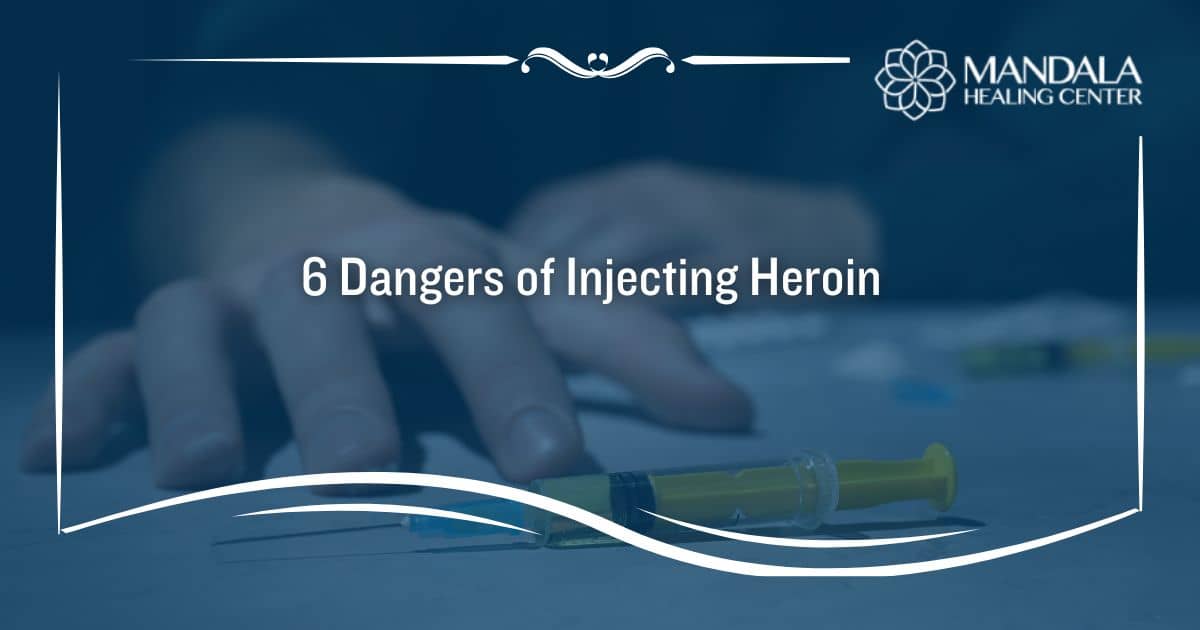Heroin is a highly addictive opioid drug that is derived from morphine. It is not approved for medicinal use and is only found on the street because of its addictive nature and high risk of adverse health effects. Unfortunately, more than a million Americans struggle with heroin addiction.[1]
While it is possible to smoke or snort heroin, most people who are addicted to the substance inject it intravenously. This is known as IV drug abuse and is typically preferred because of the potent and quick effects it causes.
There are many dangers of injecting heroin. Here are a few of the most common.
1. Addiction
The first and most obvious risk of injecting heroin is addiction. Heroin is already an incredibly addictive substance, however, when you begin to inject it, your chances of becoming addicted skyrocket.[2] This is because you are delivering the substance straight into your bloodstream, increasing the potency of the effects you experience and causing a rush of intense euphoria.
If you are worried that you or a loved one is addicted to heroin, watch out for the following signs:
- Pinpointed pupils
- Having a hard time staying awake or losing consciousness out of nowhere (“nodding out”)
- Lethargic behavior
- Mood changes
- Neglect of personal hygiene
- Needle marks on the skin
- Isolating from friends and family members
- Not being able to care for personal responsibilities
- Wearing long sleeve shirts or pants in hot weather to hide needle marks
- Experiencing symptoms of withdrawal when you cannot use heroin
- Having to routinely increase the amount of heroin you use (building a tolerance)
- Experiencing strong urges or cravings to use heroin
2. Overdose
Because shooting up heroin increases its potency and delivers the drug directly to your bloodstream, using this method of administration also increases your risk of experiencing an overdose. Heroin overdoses can be deadly, especially if you do not have access to the opioid reversal medication called naloxone (Narcan).
The signs of a heroin overdose include:[3]
- Lethargy and drowsiness
- Decreased or complete loss of consciousness
- Respiratory depression
- Bluish tint of lips and fingernails
- Shallow breathing
- Small pupils
- A distinct and labored sound coming from the throat (death rattle)
- Coma
- Death
If someone you love is experiencing a heroin overdose, contact 911 immediately. If you have access to Narcan, administer it as quickly as possible.
3. Damage to Your Veins
If you inject heroin, you will eventually cause damage to your veins. One of the most common risks of injecting heroin is collapsed veins. Collapsed veins occur when one or more veins cave in and can no longer allow blood to flow through it properly.
Other possible risks of injecting heroin into your veins include:[4]
- Venous sclerosis (narrowing and hardening of veins)
- Chronic vein disease
- Vein thrombosis (blood clot in a deep vein)
- Blown-out veins (a punctured vein that is leaking blood into your tissue)
4. Infections
When someone is addicted to heroin, abusing the substance becomes their number one priority. As a result, if they cannot access clean needles they might share them with other people. Sharing needles can put you at significant risk of contracting a wide range of infections.
Examples of infections you can contract from IV heroin use include:
- Bacterial infections that spread to other parts of your body
- HIV/AIDS
- Hepatitis B and C
- Skin infections
- Abscesses
According to the Centers for Disease Control, 10% of the 37,968 new HIV diagnoses in 2018 were contributed to IV drug abuse.[5]
5. Heart Complications
One of the biggest dangers of injecting heroin is a heart condition known as endocarditis. This condition causes inflammation of the lining of your heart, disrupting blood flow. Endocarditis can cause a wide range of life-threatening complications, including heart failure and stroke.
A part of what makes this condition so dangerous is that the early symptoms mimic the flu. As a result, people who inject drugs might leave the disease untreated during the early stages and develop life-threatening effects.
Early symptoms of endocarditis include:[6]
- High fever
- Chills
- Headaches
- Joint and muscle pain
According to new research, “Among people with opioid use disorder, the rate of endocarditis jumped from 4 per million per day to 30 per million per day.”[7]
If you or a loved one injects heroin, it is essential to seek help from a professional addiction treatment program before you develop a life-threatening condition like endocarditis.
6. Damage to Your Organs
Any type of heroin abuse can cause damage to almost every vital organ in your body. However, injecting it increases this risk. Additionally, because heroin is seldom pure, the other chemicals in your drugs could increase the risk of significant organ damage.
Many of the additives in heroin are substances that do not readily dissolve, so injecting them can result in clogging the blood vessels that lead to the lungs, liver, kidneys, or brain.[8]
When these blood vessels are clogged, you can experience infections or even cell death in various organs.
Find Help for IV Heroin Abuse and Addiction
If you or a loved one injects or shoots heroin, it’s time to seek professional help. With a combination of medical detox, evidence-based behavioral therapy, group counseling, and relapse prevention planning, you can achieve long-lasting sobriety.
To learn more about our heroin rehab programs, contact Mandala Healing Center today.
References:
- https://nida.nih.gov/publications/drugfacts/heroin
- https://nida.nih.gov/publications/drugs-brains-behavior-science-addiction/drug-misuse-addiction
- https://www.ncbi.nlm.nih.gov/books/NBK470415/
- https://www.ncbi.nlm.nih.gov/pmc/articles/PMC2748060/
- https://www.cdc.gov/hiv/group/hiv-idu.html
- https://www.nhs.uk/conditions/endocarditis/
- https://www.statnews.com/2023/01/17/addiction-spike-endocarditis-cases-hospitals/
- https://nida.nih.gov/publications/research-reports/heroin/what-are-medical-complications-chronic-heroin-use












